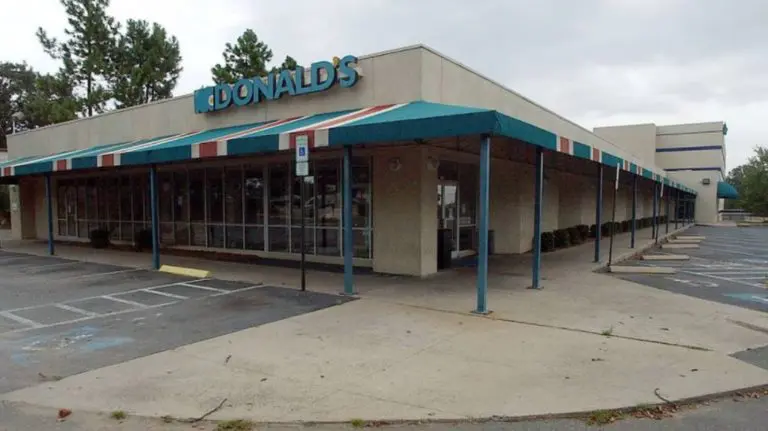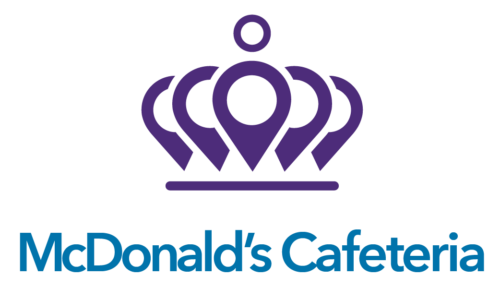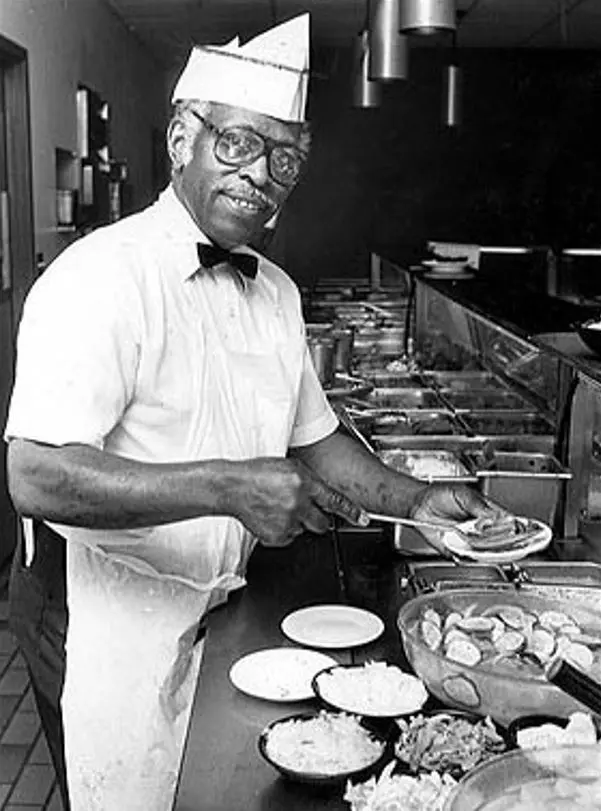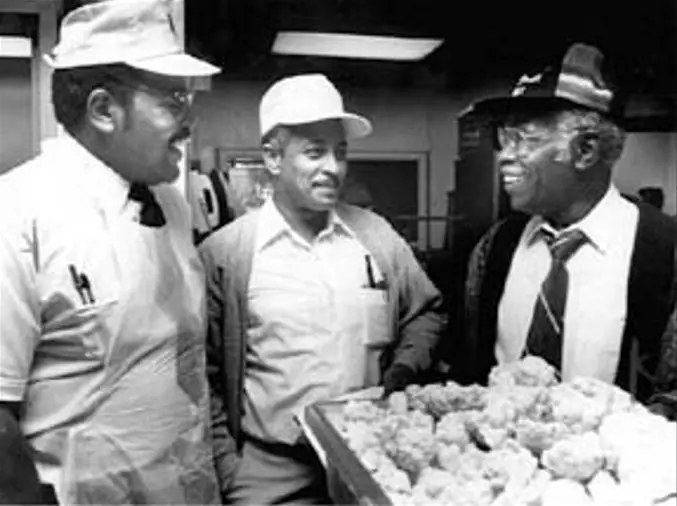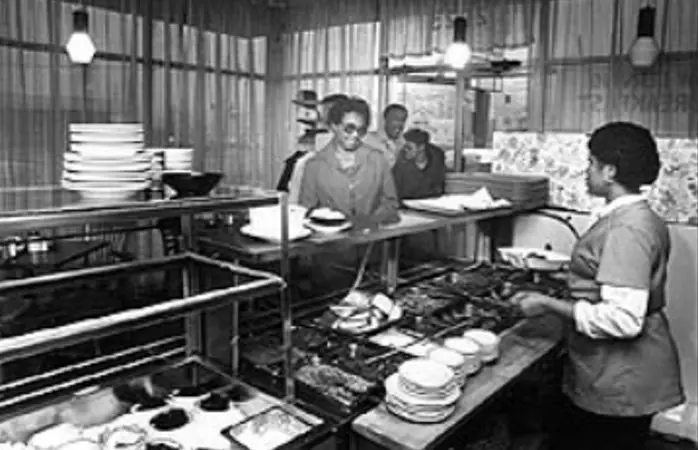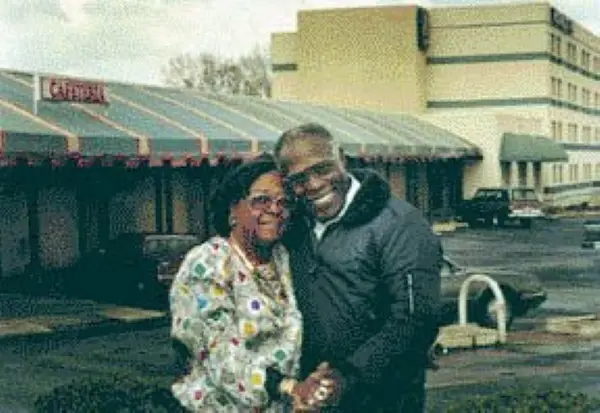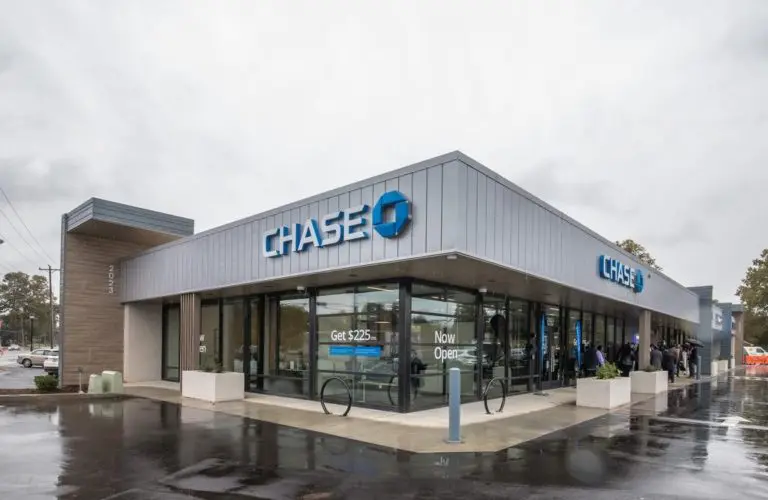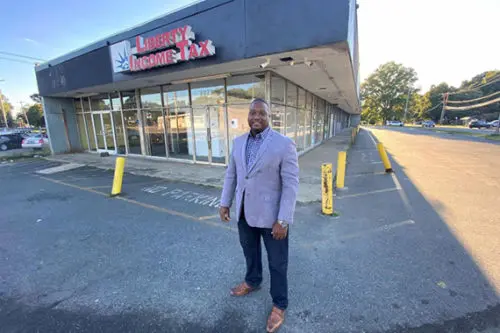The Queen City was home to a very unique and important McDonald’s restaurant: McDonald’s Cafeteria at 2023 Beatties Ford Road. McDonald’s became a meeting place for the Black community to organize politically and socially while getting a delicious meal. McDonald’s Cafeteria is also a powerful example of Black entrepreneurship in Charlotte.
John McDonald, a native Charlottean, founded McDonald’s Cafeteria. McDonald started in the restaurant business at New York Café on West Trade Street in Charlotte. From there, he, his wife Annie, and his daughter Brenda moved to Brooklyn, New York, in 1943. In New York, McDonald worked as a cook at several restaurants before deciding to go into the restaurant business himself. In 1949, McDonald opened McDonald’s Dining Room in the Bedford-Stuyvesant neighborhood of Brooklyn. His new restaurant quickly became a hit with locals, known for excellent and affordable food.
McDonald felt called by God to return home to Charlotte and began making plans to return, giving ownership of the New York restaurant to his daughter Brenda and her husband. McDonald saw a growing trend in the popularity of buffet-style cafeterias and was inspired. In 1968, the McDonalds purchased a piece of land at 2316 LaSalle Street which would be the home of McDonald’s Cafeteria and a small shopping center or mini-center.
The McDonalds believed in supporting their community including young entrepreneurs and business owners. They leased spaces in the mini-center to young site managers at low rates. McDonald remembered how hard it was starting out in Brooklyn and chose to help the next generation of business owners. In the early years, the mini-center included McDonald’s Cafeteria, a beauty and barber shop, an insurance and real estate office, and a small grocery store.
In 1970, McDonald’s Cafeteria opened for business, employing a large staff and frequently hiring college students to provide on-the-job experience. When his wife passed away in 1971, John McDonald made it his mission to make his Cafeteria successful. McDonald did a bit of everything, from running the register to cooking to washing dishes. The clientele was predominantly Black with some white patrons. White politicians stopped by from time to time to meet with Black community leaders and drum up votes. The Cafeteria served southern and soul food for breakfast, lunch, and dinner. The menu included dishes like short ribs, roast chicken, fried fish, pinto beans, and turnip greens. The most popular menu items were banana pudding and chitlins.
John McDonald became a pillar in his community by working to uplift and teach Black youth. He also worked to revitalize Black businesses in Charlotte. Even though the Cafeteria was located in a predominately Black West End neighborhood, many area businesses were not Black-owned. McDonald raised the necessary capital to open his restaurant, investing roughly $300,000 into the Cafeteria and adjoining mini-center. McDonald’s Cafeteria continued to be popular amongst Black Charlotteans, and eventually McDonald saw a need for a larger space.
In 1981, he broke ground on a larger building at 2812 Beatties Ford Road which would later become 2023 Beatties Ford Road. This new space would be just as popular as the original, quickly becoming known for phenomenal southern and soul foods. The Cafeteria continued to be a social and political hub for the Black community. This new location was 14,000 square feet, had a 300-person banquet room, and could seat 250 people in the main restaurant.
McDonald’s Cafeteria grew to have McDonald’s Inn, a Best Western franchise, and eventually Fun City, a mini-amusement park. John McDonald had the most successful Black-owned business in West End. Charlotte’s civic and business leaders saw McDonald’s success as a catalyst for significant economic growth. By 1988, McDonald’s Cafeteria was Charlotte’s most popular non-chain restaurant.
McDonald’s Inn and Fun City began to have financial difficulties in the 1990s. McDonald was looking for a buyer as his health was starting to fail. McDonald was never able to close a deal with a buyer before he passed away in 1995. The most recent site of McDonald’s Cafeteria and the mini-center, 2023 Beatties Ford Road, has been transformed into a commercial space by owner Christopher Dennis of E-Fix Development Corp along with a 2020 Beatties Ford property. The property is now Chase Bank.
McDonald’s story and the vision of building and supporting the community have continued to inspire the new owner, Christopher Dennis, who decided not to tear the building down but to renovate it. Dennis said, “Mr. McDonald had a vision of bringing communities of all different backgrounds and nationalities together.” Dennis realized that “this building had history and culture that we needed to preserve.”


